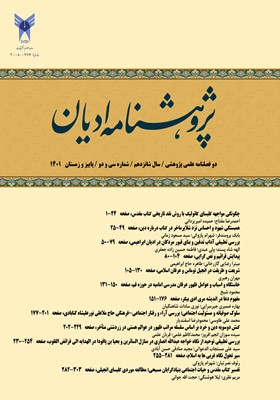چگونگی مواجهه کلیسای کاتولیک با روش نقد تاریخی کتاب مقدس
محورهای موضوعی : مسیحیتاحمد رضا مفتاح 1 * , حمیده امیریزدانی 2
1 - دانشیار دانشگاه ادیان و مذاهب قم
2 - استادیار دانشگاه ادیان و مذاهب قم
کلید واژه: آلفرد لویزی, انجمن اسقفی کتاب مقدّس, ریچارد سیمون, کلیسای کاتولیک, روش نقد تاریخی,
چکیده مقاله :
پیشانگاره نقد تاریخی این بود که کتاب مقدّس باید مانند سایر منابع عرفی با رویـکرد تـاریخی فـهم شود. جریان نقد تاریخی کتاب مقدّس ابتدا در میان پروتستانهای لیبرال به وجود آمد و افزون بر اینکه پروتستانهای محافظهکار را به تکاپو واداشت، کاتولیک ها را نیز با چالشی جدی مواجه نمود. مساله اصلی نوشتار حاضر چگونگی رویارویی کلیسای کاتولیک با چالش نقد تاریخی است. نگرانی کلیسای کاتولیک این بود که کاربست نقد تاریخی جنبههای بشری کتاب مقدس را پررنگ کند و از جنبه های الوهی آن بکاهد و در نتیجه با گذشت زمان حجیت کتاب مقدّس زیر سوال برود. از این رو، در ابتدا کلیسای کاتولیک کاربست نقد تاریخی را محکوم و پیشگامان این جریان را تکفیر کرد. نکته شایان ذکر این است که کلیسای کاتولیک به رغم مخالفت شدید و محکوم کردن روش نقد تاریخی، سرانجام به این نتیجه رسید که نسبت به تحولات دوره مدرن انعطاف بیشتری از خود نشان بدهد و تعامل الاهیات و فرهنگ و دستاوردهای بشری را به رسمیت بشناسد و روش نقد تاریخی را به عنوان یکی از روشهای تفسیر کتاب مقدّس بپذیرد.
This article discusses the historical criticism of the Bible, which originated among liberal Protestants with the belief that the Bible should be examined through a historical approach. While this approach was initially met with resistance from conservative Protestants, it later became a challenge for the Catholic Church as well. Prominent Catholic scholars such as Richard Simon and Alfred Loisy, as well as the Tübingen School, supported the movement, raising concerns within the church. The article aims to analyze how the Catholic Church addressed this challenge. The church was apprehensive that the historical-critical method would overlook the divine aspects of the Bible, resulting in a decline in biblical authority. Therefore, it denounced the trend and expelled its pioneers. However, the Catholic Church eventually came to understand that it needed to adapt to the modern age and recognize the relationship between theology, culture and human accomplishments. Consequently, it became more open towards the historical-critical method, acknowledging it as a viable approach towards biblical exegesis, despite its initial condemnation. In summary, this paper examines the historical criticism of the Bible, its origins and opposition, and how the Catholic Church eventually adapted and embraced this approach towards biblical interpretation.
_||_

